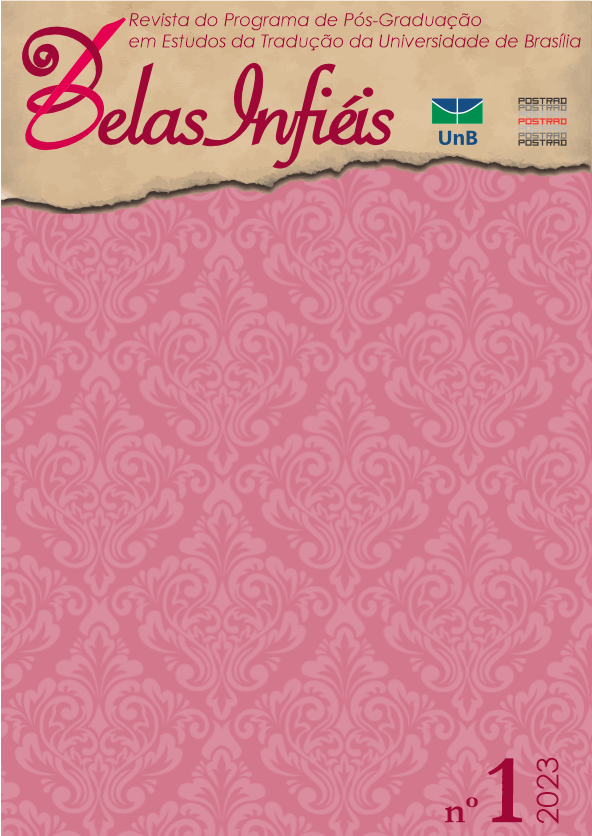The Translation of Milenio Carvalho, by Manuel Vázquez Montalbán, into Portuguese and French: From Social Taboo to Linguistic Taboo
DOI:
https://doi.org/10.26512/belasinfieis.v12.n1.2023.45324Keywords:
Translation Studies. Dysphemism. Spanish language. Portuguese language. French language.Abstract
In this article, we analyze the translation of some units of the Spanish language lexicon into Portuguese and French languages of the book Milenio Carvalho (2004), by Manuel Vázquez Montalbán, from a perspective that considers inseparable the relationship between lexicon and culture. We first address the issue of the lexicon as a cultural representation based on research of Caune (2014), Borba (2006), Nunes (2010), Lara (2015), and Antunes (2012). Next, we discuss the problematics of taboo both in its psychosocial genesis, according to the writings of Freud (2015), and from the point of view of language (Vaneigem, 2004; Allan and Burridge, 2006; Benke, 2012 Arango, 1991; Preti, 1983; Guiraud, 1976). Finally, we examine tabooisms from the standpoint of translation, in view of Antoine Berman’s (2007) work on the letter. The conclusion is that, in the translation into Portuguese, there was a certain erasure of the tabooisms, implying a softening of the text and an uncharacterization of the characters' way of expression. In contrast, in French, the tendency was to maintain the taboo lexicon and, in a certain way, to accentuate it; to intensify or make these lexical units more “dense”, “alive”, in order to depict their linguistic-discursive universe with greater “iconicity”.
Downloads
References
Allan, K., & Burridge, K. (2006). Forbidden words: Taboo and the censoring of language. Cambridge University Press.
Antunes, I. (2012). Território das palavras: estudo do léxico em sala de aula. Parábola.
Arango, A. C. (1991). Os palavrões (J. L. Bastos, Trad.). Brasiliense.
Benke, V. C. M. (2012). Tabus linguísticos nas capitais do Brasil: Um estudo baseado em dados geossociolinguísticos [Dissertação de mestrado, Universidade Federal de Mato Grosso do Sul].
Berman, A. (2007). A tradução e a letra, ou, o albergue do longínquo (M. H. C. Torres, M. Furlan, & A. Guerini, Trads). 7Letras.
Borba, F. S. (2006). Léxico e herança social. In R. C. Marchezan, & A. Cortina (Eds.), Os fatos da linguagem, esse conjunto heteróclito (10, 81–96). Cultura Acadêmica Editora.
Caune, J. (2014). Cultura e comunicação: Convergências teóricas e lugares de mediação. (L. M. de Barros, Trad.). Editora Unesp.
Colmeiro, J. (2015). Novela policiaca, novela política. Revita lectora, (21), 5–29.
Diccionario integral del español de la argentina. (2008). Ole. In Diccionario integral del español de la argentina. Buenos Aires: Voz activa.
Freud, S. (2015). Totem e tabu (P. C. de Souza, Trad.). Penguin Classics Companhia das Letras.
Guiraud, P. (1976). Les gros mots (2. ed.). Puf.
Houaiss, A. (s.d.). Cagão. In Dicionário Houaiss da língua portuguesa. Recuperado em 15 de fevereiro de 2023, https://houaiss.uol.com.br/corporativo/apps/uol_www/v6-1/html/index.php#1.
Houaiss, A. (s.d.). Safado. In Dicionário Houaiss da língua portuguesa. Recuperado em 15 de fevereiro de 2023, https://houaiss.uol.com.br/corporativo/apps/uol_www/v6-1/html/index.php#3.
Lara, L. F. (2015). Curso de lexicología. Colegio de México.
Larousse. (s. d.). Déféquer. In Dictionnaire en ligne. Recuperado em 15 de fevereiro de 2023, https://www.larousse.fr/dictionnaires/francais/d%C3%A9f%C3%A9quer/22632.
Larousse. (s. d.). Olé. In Dictionnaire en ligne. Recuperado em 15 de fevereiro de 2023, https://www.larousse.fr/dictionnaires/francais/ol%C3%A9/55824.
Larousse. (s. d.). Putain. In Dictionnaire en ligne. Recuperado em 15 de fevereiro de 2023, https://www.larousse.fr/dictionnaires/francais/putain/65181.
Larousse. (s. d.). Saloperie. In Dictionnaire en ligne. Recuperado em 15 de fevereiro de 2023, https://www.larousse.fr/dictionnaires/francais/saloperie/70726.
Moliner, M. (2007). Hostia. In M. Moliner (Org.), Diccionario de uso del español. Gredos.
Nunes, J. H. (2010). Lexicologia e lexicografia. In E. Guimarães, & M. Zoppifontana (Eds.), Introdução as ciências da linguagem: A palavra e a frase (151–172). Pontes.
Preti, D. (1983). A linguagem proibida: um estudo sobre a linguagem erótica. Queiróz.
Real Academia Española. (s.d.). Cabrón. In Diccionario de la lengua española. Recuperado en 15 de fevereiro de 2023, https://dle.rae.es/cabr%C3%B3n?m=form2.
Real Academia Española. (s.d.). Cagón. In Diccionario de la lengua española. Recuperado en 15 de fevereiro de 2023, https://dle.rae.es/cag%C3%B3n?m=form2.
Real Academia Española. (s.d.). Ole sus cojones. In Diccionario de la lengua española. Recuperado en 15 de fevereiro de 2023, de https://dle.rae.es/coj%C3%B3n?m=form2.
Simão, A. K. G., & Deângeli, M. A. (2019). As traduções de el hombre de mi vida para o francês e o português: Léxico e diferença. Caderno de letras, (34), 499–517. https://doi.org/10.15210/cdl.v0i34.16968
Vaneigem, R. (2004). Nada é sagrado tudo pode ser dito: Reflexões sobre a liberdade de expressão. Parábola.
Vázquez Montalbán, M. (2004). Milenio Carvalho I. Rumbo a kabul. Planeta.
Vázquez Montalbán, M. (2004). Milenio Carvalho II. Rumbo a las antípodas. Planeta.
Vázquez Montalbán, M. (2006). Milenio Carvalho. (D. Laroutis, Trad.). Christian Bourgeois.
Vázquez Montalbán, M. (2007). Milênio. (R. F. d’Aguiar, Trad.). Companhia das Letras.
Downloads
Published
How to Cite
Issue
Section
License
Copyright (c) 2023 CC BY

This work is licensed under a Creative Commons Attribution 4.0 International License.
Given the public access to this journal, the texts are free to use but requires the recognition of the original authorship and initial publication in this journal to be properly stated.
 The journal allows the use of works published for non-commercial purposes, including the right to submit the work to publicly accessible databases. Published contributions are the sole and exclusive responsibility of the author(s).Â



















